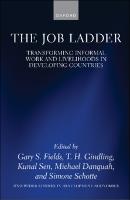The Job Ladder
Transforming Informal Work and Livelihoods in Developing Countries
| dc.contributor.editor | Fields, Gary S. | |
| dc.contributor.editor | Gindling, T. H. | |
| dc.contributor.editor | Sen, Kunal | |
| dc.contributor.editor | Danquah, Michael | |
| dc.contributor.editor | Schotte, Simone | |
| dc.date.accessioned | 2023-05-02T13:05:00Z | |
| dc.date.available | 2023-05-02T13:05:00Z | |
| dc.date.issued | 2023 | |
| dc.identifier.uri | https://library.oapen.org/handle/20.500.12657/62892 | |
| dc.description.abstract | Using a range of countries from the Global South, this book examines heterogeneity within informal work by applying a common conceptual framework and empirical methodology. The country studies use panel data to study the dynamics of worker transitions between formal and heterogeneous, informal work. The range of country studies in the book (covering Asia, Latin America, the Middle East, and North Africa and sub-Saharan Africa) allow us to present a comparative perspective across developing countries. Each country study provides a nuanced view of informality, dividing workers into six work status groups: formal wage-employees, upper-tier informal wage-employees, lower-tier informal wage-employees, formal self-employed, upper-tier informal self-employed, and lower-tier informal self-employed. Based on this common conceptual framework, the country studies examine the distribution of workers between each of these work status groups. Using panel data, the country studies document transition patterns across different formality and work status groups. The panel data analysed in each country study gives a basis for making statements about labour market transitions that are not warranted when using comparable cross sections. In addition to measuring the distribution of workers and transitions between work status groups, each country study also examines individual-level and household-level characteristics associated with workers in each work status. Using these characteristics, each country study constructs a ‘job ladder’ that ranks each work status. The country studies then examine the characteristics of workers that are associated with transitions up (and down) the job ladder. | en_US |
| dc.language | English | en_US |
| dc.subject.classification | thema EDItEUR::K Economics, Finance, Business and Management::KC Economics::KCM Development economics and emerging economies | en_US |
| dc.subject.classification | thema EDItEUR::K Economics, Finance, Business and Management::KC Economics::KCF Labour / income economics | en_US |
| dc.subject.classification | thema EDItEUR::K Economics, Finance, Business and Management::KC Economics::KCG Economic growth | en_US |
| dc.subject.other | Formal and informal work; Global South; labour market transition; work status; wage-employees; self-employed | en_US |
| dc.title | The Job Ladder | en_US |
| dc.title.alternative | Transforming Informal Work and Livelihoods in Developing Countries | en_US |
| dc.type | book | |
| oapen.identifier.doi | 10.1093/oso/9780192867339.001.0001 | en_US |
| oapen.relation.isPublishedBy | b9501915-cdee-4f2a-8030-9c0b187854b2 | en_US |
| oapen.relation.isFundedBy | c9be6ad3-6692-452d-a1f3-a3e6c74f0fe2 | en_US |
| oapen.pages | 464 | en_US |
| oapen.place.publication | Oxford, UK | en_US |

